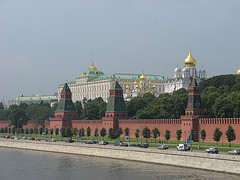Russia Sparks Energy Paranoia
By Jeremy Druker for ISN
At first glance, the announcement earlier this week that a Russian company had bought a fifth of a Hungarian refining company might seem to warrant a brief news item on the business pages. In reality, Surgutneftegaz's surprising €1.4 billion (US$1.87 billion) purchase of 21 percent of MOL has alarmed officials across Europe worried about Russian expansion into the EU's security sector.
The deal has also sparked worries - bordering on outright panic - among newspaper columnists in Central Europe.
The issue of energy dependency on Russia has been high on the agenda of European officials for years, but hit home in January during the Russian-Ukraine gas dispute. Many continue to view any acquisitions by Russian energy companies in Europe as part of a Kremlin-led strategy to stymie efforts at diversification, whether the Russian companies involved are state-owned or private.
The latter category technically fits Surgutneftegaz, but no one really knows who controls the company, which has a notoriously opaque ownership. Allegations have surfaced over the years of a special relationship with the Kremin, and the Financial Times and others have asserted that Vladimir Bogdanov, the head of the company, is a close ally of former Russian president and current Prime Minister Vladimir Putin.
The purchase seems to have hit those worried about Russian influence in the EU's energy sector particularly hard because it was so unexpected. Austrian oil company OMV had cherished its shares in MOL, trying for years to gain control over its Hungarian rival, only to be repeatedly rebuffed.
In the end, OMV apparently lost patience with the lack of progress and opposition of various Hungarian government officials, and began to negotiate with Surgutneftegaz. After the announcement of the purchase - the Russian company's first abroad - Budapest claimed to have been taken by surprise.
That reality has pointed up the chimera of supposed EU cooperation, as Czech commentator Jan Machacek observed in his daily column on the website of Respekt, a Czech news magazine.
“What good is it that European states strive for questions of European energy security to be managed on the basis of consensus and shared goals from Brussels? Individual governments then return from Brussels and make their own deals,” he wrote.
Even in the midst of the financial crisis, Surgutneftegaz was willing to pay twice the market price for part of MOL. Some, like Machacek, have alleged that the Russians overpaid in order to sway the Austrian government toward supporting the Russian-based South Stream gas line project instead of Nabucco, which is backed by the US and some EU states.
In the Czech Republic, the Hungarian deal has added to a feeling that Russian influence both in the energy sector and at the highest echelons of power has been increasing. The Russian company TVEL will, beginning in 2010, start supplying the Czech nuclear power plant Temelin with fuel, replacing Westinghouse, the American firm; a Czech subsidiary of the Russian company OMZ will take part in additional work on Temelin; and Gazprom, the Russian gas giant, controls Vemex, the second largest importer of gas from Russia, whose share in the local gas market has grown to 12 percent, four times what it was two years ago.
More mysterious has been President Vaclav Klaus's relationship with Lukoil, the Russian oil company. Information surfaced last year that Lukoil had paid for the Russian translation of a book Klaus authored that denies the existence of global warming.
But in early March, Respekt raised more questions, reporting on a secret meeting last fall between Klaus and Vagit Alekperov, the head of Lukoil and another friend of the Kremin (he has been “allowed” to keep his vast fortune while the Kremlin has readily struck down other oligarchs). Although Klaus hosted Alekperov at Prague Castle, the president's office has labeled the meeting “informal” and refused to disclose its content.
Respekt reported that the government had no advance knowledge of the visit and that some cabinet members only found out about the meeting through a regular report from the BIS, the domestic secret service. The magazine also said that the two men had met, secretly, a short time before Klaus was reelected president in February 2008. At the time Alekperov also met with Prime Minister Mirek Topolonek and Alekperov’s deputy met with then Minister of Transportation Ales Rebicek - again without any public explanation.
Klaus has long been seen as pro-Russian, including in his comments on the Russian invasion of Georgia last fall, when Klaus’ criticism of Russia was much tamer than that of other European leaders.
Lukoil apparently has big plans for the Czech Republic, having chosen the country as the base for a wave of wide-ranging investments in Central Europe. The company already owns about 50 gas stations that it bought from Conoco, part of a network of over 400 throughout Central Europe. More controversial, according to Respekt, the company received a 20 percent share - without a public tender - to supply fuel to the Prague airport.
All of that activity, plus that of other Russian companies, led Jaroslav Spurny of Respekt to warn in an opinion piece in early March that these “business” moves were all “about acquiring power and influence, by which the Kremlin could determine the political development of a country in which it has an interest.”
If Czech commentators didn't already have enough to fuel fears of Russian expansion, the business daily Hospodarske noviny reported on 1 April that a secret buyer (or buyers) has evidently been buying up shares of CEZ, the state-controlled energy colossus. CEZ and MOL have a joint venture to pursue projects together, including the construction of new power plants.
For years, the Czech government has resisted lucrative entreaties to sell its portion of the highly profitable CEZ. Speculation has focused on Gazprom, among others, as the possible suitor, and if should that come true, the current paranoia over Russian expansioin would likely boil over into outright hysteria.
